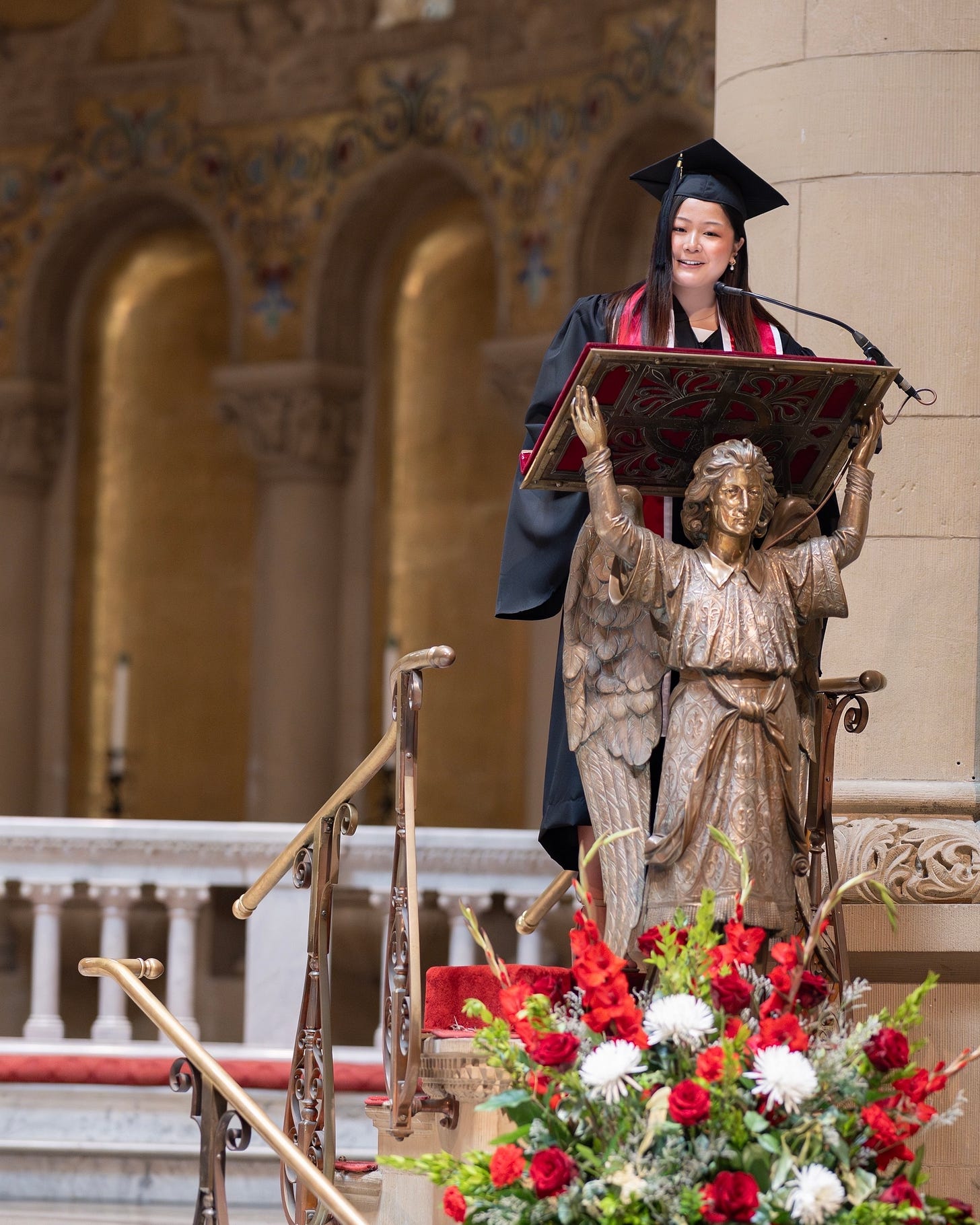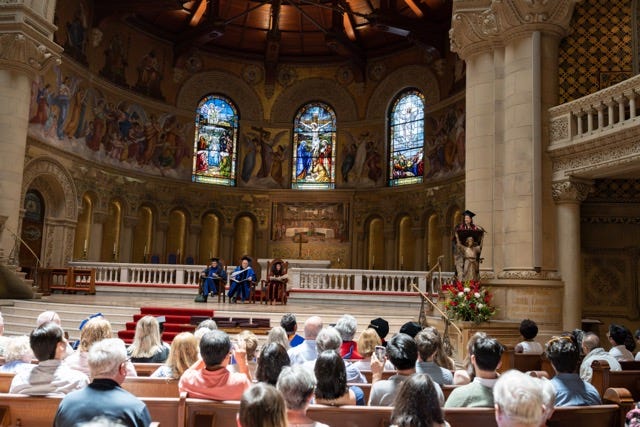The Greatest Invention
Also known as: the title of my Stanford graduation speech. Congratulations, Class of 2025!
After six months lost to the fog of thesis deadlines and the slow, soul-sucking trudge toward graduation, I’m easing back into Substack. I didn’t mean to step away from writing for so long. In many ways, I didn’t: I wrote a 124-page honors thesis that won a departmental award, finished a small forest’s worth of final papers, and presented research at two academic conferences. Still, it’s only now that my brain and body have begun speaking to each other again. In that spirit of reunion, I wanted to share the graduation speech I gave last week.
I don’t remember much from graduation weekend—just the early mornings, the missed meals, the hours of walking and talking in too-hot clothes. It was the first time I hosted my parents and siblings in California. It was also the last time I packed up my dorm. The Monday after I gave this speech, I moved to Los Angeles.
And yet, writing and delivering it felt like a full-circle moment. A repairing of sorts. This newsletter began with big questions—about whether college is worth it, and what happens to a field when its foundations start to erode. So much of my education has been about doubt—sitting with it, writing through it, learning to hold it without flinching. That the English faculty chose me to speak was a true honor. But the deeper gift was this: to have been part of a program so alive, so generous, that I left with more words than I arrived with—and could offer them back, shaped into something whole.
So here it is.
“The Greatest Invention” by Ellen Yang
Delivered June 14, 2025, at the Stanford English Department graduation ceremony in Memorial Church. (Yes, seriously—I got to speak from the lectern and everything. Preacher-style.)
Good afternoon—faculty, family, friends, and most importantly, the graduating class of 2025.
Of all the tools humans have created—wheels, engines, vaccines, algorithms—I still believe the greatest is the book. Not just for what it is, but for what it holds: the invention of language. The power to turn sound into meaning, and meaning into memory.
Language, writing, reading—these are all human technologies. Not natural, but made. And over the past four years, we’ve learned to use them with care, to practice the work of close reading.
In our classes, we watched for the rhythm of a sentence, the weight of a word, the turn of a thought. Close reading taught us that every element—punctuation, syntax, silence—holds something special, if we’re willing to look. And eventually, that practice became instinct. We started reading everything—text messages, headlines, even each other—with the same care we once reserved for Woolf or Baldwin or Morrison. Not to dissect, but to understand.
We moved across genres, eras, and traditions—from The Canterbury Tales to Shakespeare, from modernism to contemporary fiction. Each text helped us inhabit unfamiliar places and people, and through them, imagine new futures—our own, and the world’s. The fact that we’re here today, about to walk across this stage, is proof of that imaginative work.
And we didn’t do it alone. We had professors who treated our ideas with seriousness and care. TAs who met us where we were and pushed us further. And classmates who became close friends through the shared joy of asking hard questions and staying with difficult ideas.
These relationships—formed around something as simple as the book—taught me something lasting: that we are never truly alone in our reading. Even when we interpret things differently, we’re united by the shared impulse to understand, to question, to even create. That’s what makes dialogue possible. And that’s what moves us forward—not just as readers, but as people.
This belief carried me through my honors thesis work this year, where I studied a narrative style built on what’s left unsaid between characters. I call it “dialogic implicature”—a form that mirrors real conversation. I wrote about the novels of Sally Rooney. But really, I was writing about us.
We are a generation fluent in subtext and silence. We live in a world where clarity is fragile, and the things that matter the most—love, pain, truth—are often the very things we must infer.
They call this the Age of Information, but more and more, it feels like the Age of Misinformation—a time when meaning isn’t just elusive, but easily twisted or drowned out.
In this age, attention isn’t just academic. It’s human. It’s how we understand the world—and how we begin to change it.
That’s why I believe the study of literature offers all of us here something necessary and vital. It deepens our empathy. It teaches us to ask better questions. It reminds us that language is never neutral, but always alive. And most importantly, it keeps us in conversation—with texts, and with each other.
In a world that moves too fast to feel, we chose a discipline that asked us to slow down. To reread. To look again. Close reading is more than a method—it’s a way of being. And through it, we’ve learned something rare: how to hold uncertainty without turning away.
So as we leave Stanford, we carry more than a degree. We carry a deep understanding of what the greatest human invention really is, beneath its covers and pages: the power to shape meaning through language, and the world through meaning.
Wherever we go next, let us keep closely reading—with curiosity, with courage, and with the quiet conviction that meaning is still worth the work of finding.
Thank you, and congratulations to the extraordinary class of 2025. I am so proud of us!
Starting next Tuesday, I will be publishing every week again! I promise. No more thesis writing or coursework to get in the way.
Though, is now a bad time to mention I did start my own company? Well, more on Punctuation PR next time.





“We live in a world where clarity is fragile, and the things that matter the most—love, pain, truth—are often the very things we must infer.” This is so good, Ellen. I wish you’d given this speech at my English MA graduation ❤️🩹🥹